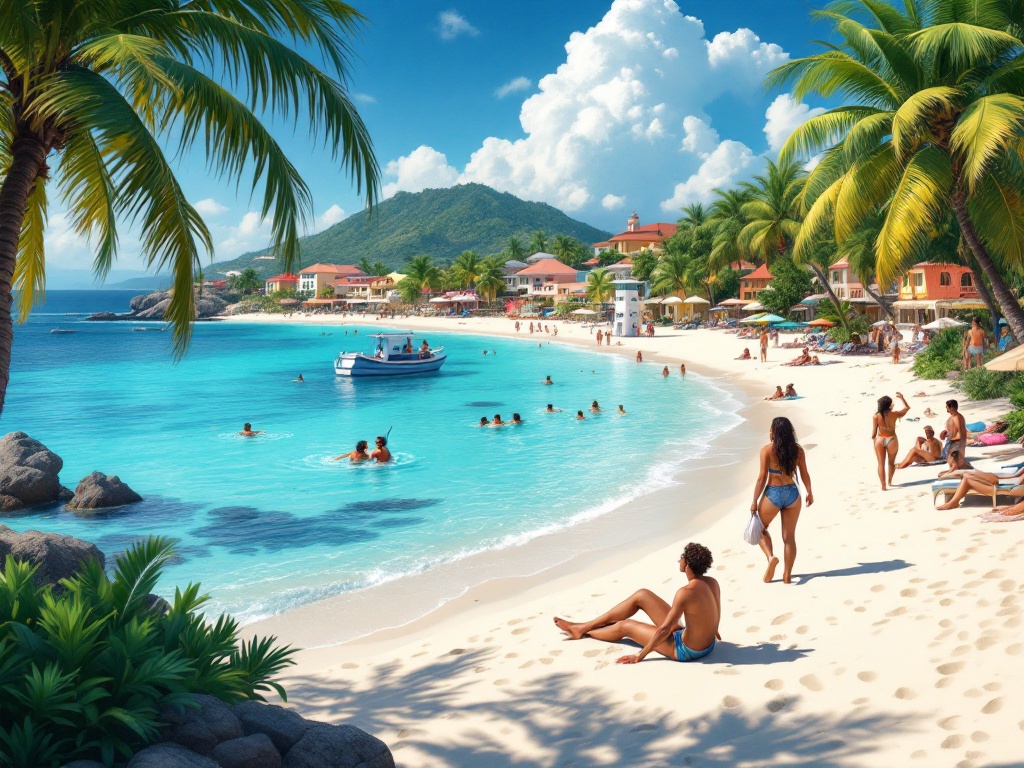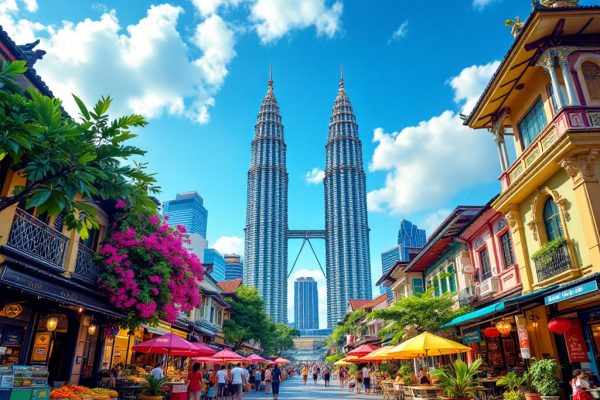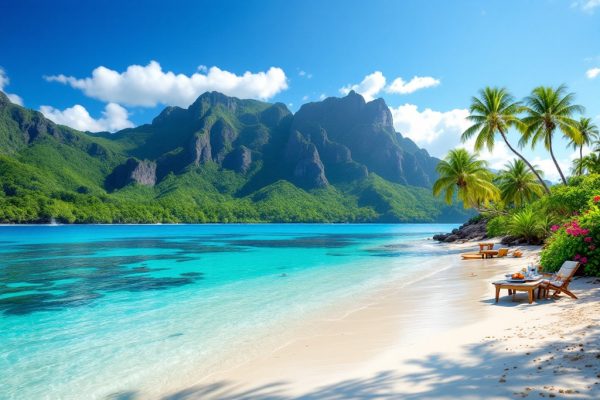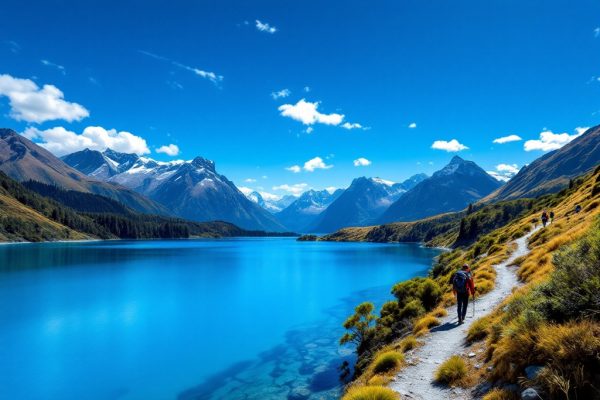Safest Tropical Places to Travel in 2025
Dreaming of a worry-free tropical escape in 2025? Discover the safest Caribbean and tropical destinations, from the tranquil shores of Dominica to the vibrant culture of the Cayman Islands. Explore islands with low crime rates, robust security measures, and top-notch tourism infrastructure, ensuring a relaxing and unforgettable vacation. Learn how to maximize your safety with expert travel tips and discover the peace of mind that comes with exploring the world’s most secure paradises. Dive in and start planning your dream getaway today!
Important information

- Several Caribbean islands are identified as safe for travel in 2025, including Dominica (ideal for solo travelers), the Cayman Islands (family-friendly), Aruba, Turks & Caicos, St. Maarten, Bonaire, the Virgin Islands, St. Kitts and Nevis, Saint Lucia, Bermuda, Anguilla, Martinique, Grenada, Antigua and Barbuda, and the Bahamas.
- Factors contributing to the safety of these destinations include low crime rates, robust security measures (like visible police presence and well-lit public areas), government investment in tourism infrastructure, and access to quality healthcare.
- Martinique is considered the safest Caribbean island according to the Caribbean Tourism Quality Index.
- Travelers are advised to take standard safety precautions such as being aware of their surroundings, securing valuables, respecting local customs, and avoiding isolated areas.
- Travel insurance is recommended to cover trip cancellations, medical emergencies, and lost luggage.
Safest Tropical Places to Travel in 2025
Dominica combines a friendly local community with a strong focus on ecotourism. The Cayman Islands provide a secure, welcoming environment. Aruba incorporates security into its infrastructure. Turks & Caicos is considered among the safest islands in the region. St. Maarten maintains a strong reputation for safety. Bonaire offers a unique blend of safety and sustainable tourism. The Virgin Islands are a quiet haven. St. Kitts and Nevis are known for hassle-free visits. The Bahamas provides several safe tourist spots.
Saint Lucia prioritizes visitor safety, boasting top-notch security measures. Bermuda enjoys a remarkably low crime rate. Anguilla offers a peaceful escape. Martinique is often lauded as the safest Caribbean destination. Grenada is generally safe for cautious travelers. Antigua and Barbuda boast some of the region’s most secure resorts.
Understanding Safety in Tropical Destinations
Safety in tropical destinations depends on several key elements:
- crime rates,
- government security measures,
- local attitudes.
These factors create the overall atmosphere of a place, influencing travelers’ safety.
Travelers can choose destinations that match their safety preferences.
- Someone worried about pickpocketing might choose a place with visible policing.
- Another might prioritize a location known for its cultural understanding.
Familiarizing oneself with local customs contributes to a safer and more enriching travel experience.
Benefits of Choosing Safe Tropical Places
Safe tropical destinations offer incredible benefits, enhancing enjoyment and providing invaluable peace of mind. Travelers can truly appreciate the stunning landscapes and vibrant cultures, embracing adventure without safety concerns. Prioritizing tourism, these destinations offer excellent accommodations and enriching experiences, creating positive memories for a truly unforgettable trip.
Factors Making These Destinations Safe
Low crime rates, fostered by effective policing and stable governance, create a sense of security.
A robust tourism infrastructure, including reliable transportation and comfortable accommodations, is also essential.
Access to quality healthcare and established emergency protocols further enhances traveler safety.
Together, these elements cultivate a secure environment where visitors can relax and fully enjoy their trip.
Low Crime Rates and Security Measures
Dominica, the Cayman Islands, and Saint Lucia are renowned for their low crime rates and dedication to tourist safety. These islands have implemented robust security measures to ensure a secure environment for visitors.
- Visible police presence,
- Well-lit public areas,
- Dedicated tourist police.
These measures effectively deter crime, contributing to a safe and enjoyable experience for travelers. However, it’s important to remember that petty theft can occur anywhere. Visitors should remain vigilant and take precautions to safeguard their valuables.
Government and Tourism Infrastructure
Governments are investing in new programs and improved infrastructure to enhance visitor safety. For example, destinations like Aruba and Bermuda have incorporated security measures directly into their infrastructure, creating safer public spaces and more secure accommodations. These enhancements provide better protection for tourists.
Top Safest Caribbean Destinations for 2025
Dominica, focused on ecotourism, is a unique haven for solo travelers. Saint Lucia prioritizes visitor safety with robust security measures. Bermuda stands out with a remarkably low crime rate. St. Maarten and Anguilla are known for their tranquility and low crime. The Virgin Islands provide a quiet, secure escape. St. Kitts and Nevis are generally trouble-free.
- Dominica: ecotourism focus, ideal for solo travelers.
- Saint Lucia: robust security measures.
- Bermuda: remarkably low crime rate.
- St. Maarten & Anguilla: tranquil and low crime.
- Virgin Islands: quiet, secure escape.
- St. Kitts & Nevis: generally trouble-free.
Couples and families will appreciate the secure, friendly atmosphere of the Cayman Islands. Aruba’s tourism infrastructure is built on safety and peace of mind. Turks & Caicos enjoys a reputation as one of the safest Caribbean destinations. Martinique offers another safe option. Bonaire balances sustainable tourism with visitor security. Common sense precautions ensure a safe trip to Grenada. Antigua and Barbuda, like the Bahamas, offer safe resorts and secure tourist areas.
- Cayman Islands: secure, friendly for families and couples.
- Aruba: tourism focused on safety.
- Turks & Caicos: renowned for safety.
- Martinique: safe and secure.
- Bonaire: sustainable tourism and visitor security.
- Grenada: safe with common sense precautions.
- Antigua, Barbuda, Bahamas: safe resorts and tourist areas.
A wealth of Caribbean islands provide safe and enjoyable vacations.
Dominica: A Standout for Solo Travelers
Dominica’s remarkably low crime rate makes it a haven for solo travelers seeking adventure in a safe and welcoming environment. The island’s focus on nature and adventure tourism fosters this peaceful atmosphere, perfect for independent exploration. It’s an ideal choice for thrill-seekers and those simply desiring peace of mind.
Cayman Islands: Friendly and Secure
The Cayman Islands offer a welcoming and secure environment. Low crime rates contribute to a pervasive sense of safety for visitors.
Saint Lucia: High Ranking Security Measures
Saint Lucia boasts impressive safety records, characterized by low crime rates and a government committed to security. These measures, along with a focus on tourist safety, ensure visitors can enjoy a secure and worry-free experience.
Aruba: Designed with Tourism Security in Mind
Aruba prioritizes tourist safety, ensuring public areas, beaches, and hotels are secure and easily accessible.
Bermuda: Remarkably Low Crime Rate
Bermuda is renowned for its safety, boasting a remarkably low crime rate and excellent infrastructure that further enhances security. This secure environment allows visitors to relax and fully enjoy their trip.
Turks & Caicos: One of the Safest Islands
The Turks & Caicos Islands offer a remarkably safe environment for Caribbean travelers due to their low crime rates. Visitors can relax, enjoy the islands’ beauty, and feel secure in this tranquil paradise.
St. Maarten: A Safe Island to Visit
St. Maarten is known for its low crime rates, making it a safe and popular choice for a relaxing vacation. This Caribbean gem offers a worry-free escape for travelers.
Anguilla: Known for Low Crime Rates
Anguilla is a remarkably safe haven in the Caribbean, boasting incredibly low crime rates. This allows visitors to truly relax and savor the island’s beauty.
Martinique: The Safest Destination in the Caribbean
Martinique holds the distinction of being the safest Caribbean island, according to the Caribbean Tourism Quality Index. This prestigious title underscores the island’s commitment to visitor safety, enabling travelers to experience its beauty and tranquility with peace of mind.
Bonaire: Safety and Sustainable Tourism
Bonaire is known for its safety and commitment to sustainable tourism. It actively protects its environment, preserving coral reefs and utilizing renewable energy. This eco-conscious approach enhances safety by encouraging responsible development and improving community well-being, offering visitors a secure and sustainable experience.
The Virgin Islands: Safe and Quiet
The U.S. Virgin Islands are known for their peaceful ambiance, offering serene beaches ideal for tourists looking for relaxation and a tranquil escape.
Grenada: Safe with Common Sense Precautions
Grenada is generally safe for tourists, but it’s always wise to be cautious and aware of your surroundings.
St. Kitts and Nevis: Trouble-Free Visits
St. Kitts and Nevis offer a safe and worry-free travel experience.
Antigua and Barbuda: Safest Resorts
Looking for a safe and luxurious Caribbean getaway? Antigua and Barbuda boasts several resorts renowned for their robust security and tranquil atmosphere. Consider these options:
- Curtain Bluff: This haven offers a peaceful setting with minimal crime.
- Hermitage Bay: Known for its tranquility and security, Hermitage Bay provides a true escape.
- Carlisle Bay: Another excellent choice for safety and serenity, Carlisle Bay is known for its calm environment.
For unparalleled privacy, consider Jumby Bay Island, a private island resort offering a true escape from the everyday.
The Bahamas: Safe Tourist Destinations
The Bahamas offers a multitude of secure islands, favored by tourists for their low population density and tranquil atmosphere. These islands are famous for spectacular landscapes and welcoming locals.
Saint Lucia presents another safe Caribbean escape, a beautiful island nation known for its security and stunning scenery.
Travel Tips for a Safe Tropical Vacation
Be aware of your surroundings, especially in crowded areas or unfamiliar locations. Secure your valuables and avoid displaying expensive items like jewelry or electronics. Respect local customs and laws. Steer clear of isolated or poorly lit areas, particularly at night. Inform someone of your itinerary and expected return.
Carry copies of important documents such as your passport, keeping the originals safely stored. Consider registering with your embassy or consulate upon arrival. Learning basic local phrases can be invaluable in emergencies. Stay informed about weather conditions and potential natural disasters.
Research the safety of local transportation options and familiarize yourself with common scams to avoid falling victim. Exercise caution with food and drinks from unfamiliar vendors. Pack a basic first-aid kit and consider purchasing travel insurance for added peace of mind.
Common Sense Security Practices
Be mindful of your surroundings and avoid displaying expensive items like jewelry or electronics.
Travel with a companion whenever possible, especially at night, and stick to well-lit and populated areas.
Utilize your hotel safe for passports, extra cash, and other valuables.
Keep someone at home updated on your itinerary and any changes to your plans.
Stay informed about local conditions and heed any safety advisories.
Confirm your transportation is legitimate before boarding.
Exercise caution with overly friendly strangers and never leave your drinks unattended.
Keep a close eye on your belongings at all times.
Understanding Level 1 Travel Advisory
Exercise normal precautions, there is a low risk (Level 1 Travel Advisory).
Travel Insurance and Precautions
Travel insurance protects your finances by covering trip cancellations, medical emergencies, and lost luggage. Consider medical evacuation coverage, especially for trips to remote locations. Take safety precautions. Copy important documents and share your itinerary with someone you trust. Register with your embassy or consulate upon arrival, particularly if traveling solo, for added security.
Travel Insurance Benefits
- Covers trip cancellations.
- Covers medical emergencies.
- Covers lost luggage.
Safety Precautions
- Copy important documents.
- Share your itinerary with a trusted contact.
- Register with your embassy or consulate upon arrival, especially if traveling solo.

















